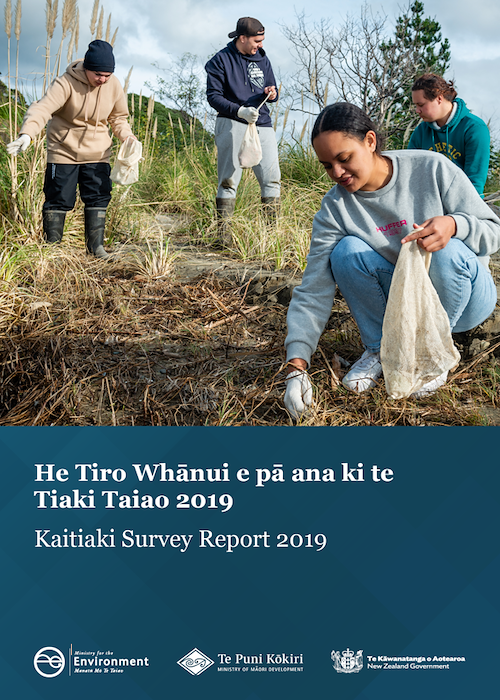He Tiro Whānui e pā ana ki te Tiaki Taiao 2019: 2019 Kaitiaki Survey Report
The Ministry for the Environment (MfE) has released a report describing the 2019 Kaitiaki survey’s findings.
He Tiro Whānui e pā ana ki te Tiaki Taiao 2012: 2012 Kaitiaki Survey Report
The Te Puni Kōkiri Kaitiaki Survey was conducted between September and November 2012 with individuals and organisations that do environmental work and engage in Resource Management Act 1991 processes on behalf of iwi or hapū, or both. The Kaitiaki Survey is a first step in establishing baseline information about how iwi and hapū are involved in natural resource management, including Resource Management Act processes. This report summarises the Kaitiaki survey results. Published in 2013.
Owners' Aspirations Regarding the Utilisation of Māori Land
Te Puni Kōkiri commissioned case study research to improve its knowledge base about land utilisation and identify areas of improvement in current regulatory regimes so as to promote Māori land utilisation. The report, “Owners’ Aspirations Regarding the Utilisation of Māori Land”, sought to identify the aspirations that Māori have for their land and how these can best be supported.
Aquaculture Development in New Zealand: Scientific and Technical Information to Inform Māori.
We regret to inform you that this publication is currently unavailable. We apologise for this delay.
Ahumoana Ahutāngata, Aquaculture Development in New Zealand: Scientific and Technical Information to Inform Māori
Māori figure prominently in the aquaculture industry and government strategies for aquaculture development. While the promotion of Māori success is specified in The New Zealand Aquaculture Strategy, all 10 points in the strategy are important aspects for Māori, and iwi will be critical in delivering these aspects of the plan in order to achieve the vision of a $1 billion industry by 2025.
Planning for Aquaculture
The introduction of new aquaculture legislation and the lifting of a moratorium that had been placed on new aquaculture development has created significant new opportunities for Māori. This information sheet looks at how new aquaculture developments are now planned for. 4 pages.
Business Services for Aquaculture
This information sheet lists some of the public and private sector business support services, funding sources and training opportunities available to assist Māori to develop business opportunities in the aquaculture industry. 4 pages.
Aquaculture Science Providers
A critical component of any aquaculture activity is access to robust scientific information, research, development, and the piloting of new technology. This information sheet lists some of the many organisations that offer these components, delivering scientific research, support, and technological advances in the aquaculture industry. 2 pages.
The Aquaculture Settlement
This information sheet provides a brief overview of the Māori Commercial Aquaculture Claims Settlement Act 2004. 4 pages.
Getting into the Aquaculture Industry
Whether you are looking to enter the aquaculture industry, or expand your existing business, this information sheet provides guidance on what you need to know. 1 page.
Roles and Responsibilities in Aquaculture
This information sheet sets out the Government's position on aquaculture, and explains the roles and responsibilities of relevant stakeholders in aquaculture: key central government agencies; local government; Te Ohu Kaimoana; Iwi Aquaculture Organisations; and New Zealand Aquaculture Ltd. 4 pages.
Māori and Aquaculture Development
This paper discusses how tangata whenua can: Engage with the planning processes for aquaculture development; Develop relationships with the aquaculture industry; and Implement arrangements for the allocation of aquaculture assets. The aim is to provide tangata whenua with sufficient information and tools to enable their own aquaculture development within their own kaitiakitanga, and for effectively influencing regional planning to take their values into account. 31 pages.
The Aquaculture Industry
This information sheet is a brief introduction to the aquaculture industry. It focuses on sea (marine)-based aquaculture. 2 pages.
Māori and Council Engagement Under The Resource Management Act 1991
In late 2004, Derek Fox and a Te Puni Kokiri analyst travelled to six regions throughout New Zealand and met with selected Māori groups, hapu and iwi, and the corresponding regional and territorial authorities.
Māori Council Engagement Under the Resource Management Act 1991
This case studies report presents the views of council staff and Maori resource management practitioners on the current processes and structures that local authorities have in place to engage with Maori under the RMA.














